All products and services are For Research Use Only and CANNOT be used in the treatment or diagnosis of disease.
Creative Biolabs offers a wide range of anti-VEGFR-2 CAR-related products for global customers. For more VEGFR-2 CAR products and services, please feel free to contact us.
Vascular endothelial growth factors (VEGFs) serve as a major kind of regulator for angiogenesis and angiogenesis, activating the angiogenesis signaling pathway by binding with VEGFRs on the cell surface. VEGFR-2, the main receptor of VEGF, is expressed in vascular endothelial cells and plays an important role in angiogenesis. Mature VEGFR-2, a 230 kD transmembrane glycoprotein, regulates intracellular signal transduction in many biological processes and is considered an important target involved in cancer therapy.
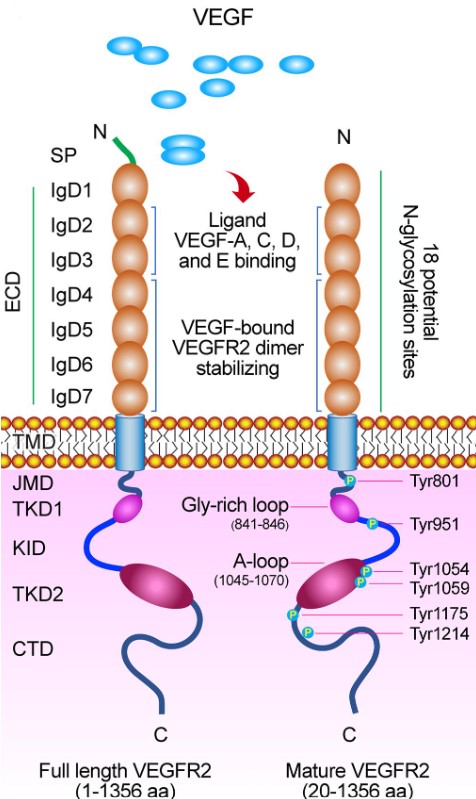 Fig.1 Schematic diagram of the VEGF/VEGFR-2 structure.1
Fig.1 Schematic diagram of the VEGF/VEGFR-2 structure.1
Anti-VEGFR-2 CAR-T Expression Test
Creative Biolabs provides customers with many sensitive CAR detection reagents and CAR expression test services to more directly measure CAR expression levels.
Anti-VEGFR-2 CAR-T Proliferation Test
To test the proliferation ability of CAR-T cells under specific antigen stimulation, we have established several methods for customers to choose from, including but not limited to, proliferation marker staining test, cell counting, etc.
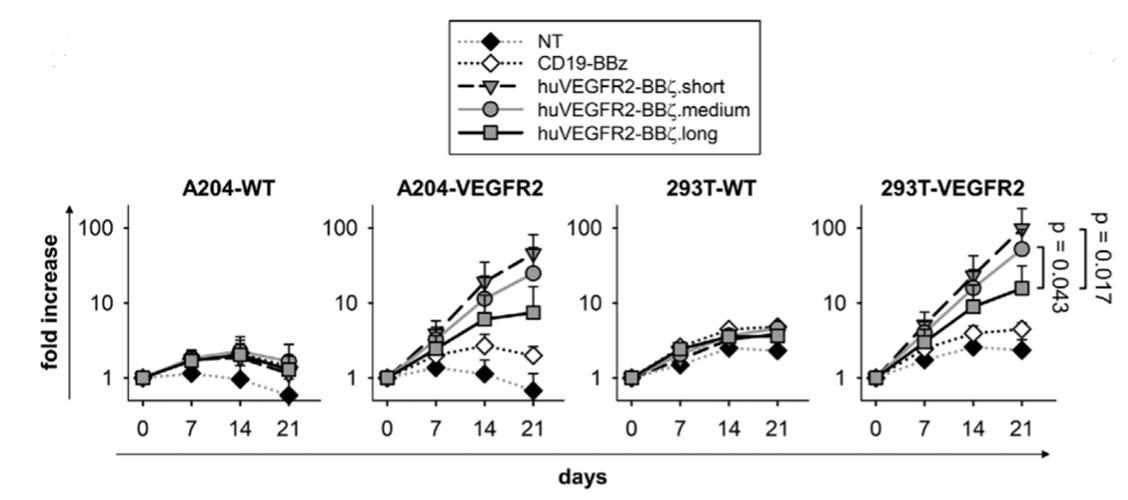 Fig.2 In vitro proliferation analysis of anti-VEGFR2 CART cells with antigen stimulation.2
Fig.2 In vitro proliferation analysis of anti-VEGFR2 CART cells with antigen stimulation.2
Phenotype Analysis of Anti-VEGFR-2 CAR-T
Phenotypic analysis is often used to detect related functions of CART cells, such as activation, exhaustion, etc. To provide customers with better service, we have launched a comprehensive set of relevant testing services, including exhaustion markers test (e.g., PD1, LAG-3, TIM-3), and immunophenotype detection (cell population analysis).
 Fig.3 Expression detection of exhaustion markers PD1 and LAG-3 of VEGFR-2 CART cells (CD3+subgroup) before and after antigen stimulation.2
Fig.3 Expression detection of exhaustion markers PD1 and LAG-3 of VEGFR-2 CART cells (CD3+subgroup) before and after antigen stimulation.2
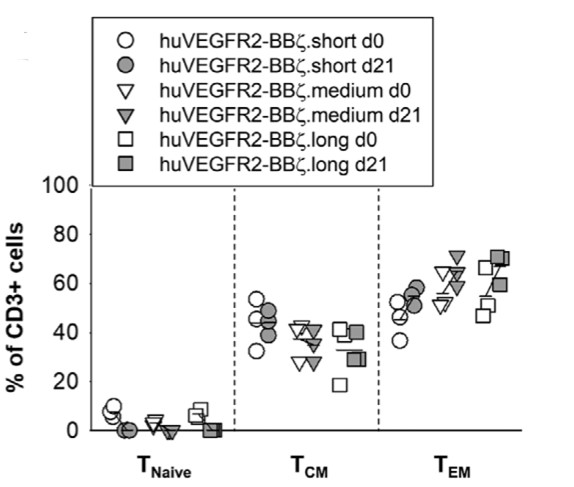 Fig.4 Immunophenotype detection of VEGFR-2 CART cells (CD8+subgroup) before and after antigen stimulation.2
Fig.4 Immunophenotype detection of VEGFR-2 CART cells (CD8+subgroup) before and after antigen stimulation.2
Degranulation Test of Anti-VEGFR-2 CAR-T
CD107a degranulation test is a commonly used assay to assess immune cell activation and antitumor activity. Cytotoxic lymphocytes (such as CD8+ T and NK cells) recognize and kill tumor cells through a classical pathway through immune secretion of lytic granules to mediate killing. In this process, the membrane expression of CD107a serves as a marker of immune cell activation and cytotoxic degranulation. Creative Biolabs has established a robust CD107a degranulation assay for global customers to support CART development.
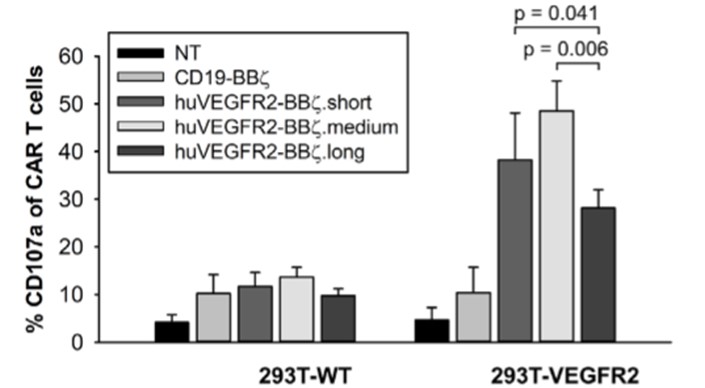 Fig.5 In vitro CD107a degranulation test of anti-VEGFR-2 CAR-T cells co-cultured with target cells.2
Fig.5 In vitro CD107a degranulation test of anti-VEGFR-2 CAR-T cells co-cultured with target cells.2
Anti-VEGFR-2 CAR-T Cytokine Release Test
Creative Biolabs provides a full list of cytokine detection services (e.g., IL-2, IL-6, TNF-a) including cytokine release test, intracellular cytokine test assays by a variety of methods such as flow cytometry, ELISA, beads-based multiplex array methods, which enable customers to accurately detect the target specificity of CAR T cells in response to specific stimuli and the levels associated with cytokine production and release.
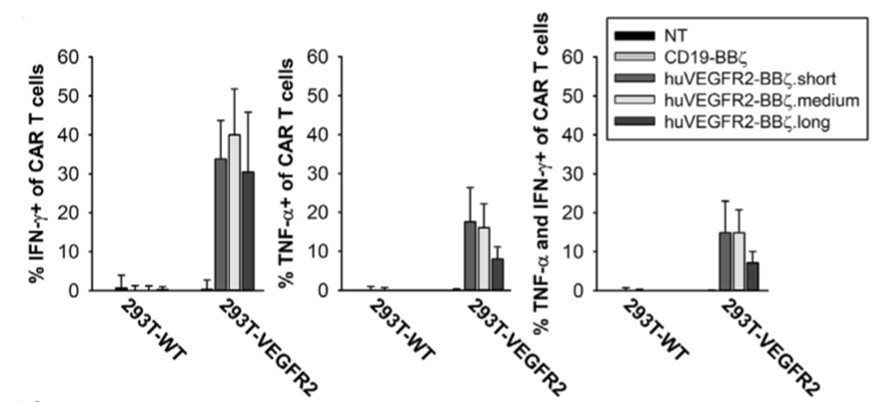 Fig.6 Intracellular cytokine evaluation of anti-VEGFR-2 CAR-T cells co-cultured with target cells by flow cytometry.2
Fig.6 Intracellular cytokine evaluation of anti-VEGFR-2 CAR-T cells co-cultured with target cells by flow cytometry.2
Anti-VEGFR-2 CAR-T In Vitro Cytotoxicity Assay
In vitro killing tests provide strong data on antigen specificity and the effectiveness of CART cells against tumor cells. At Creative Biolabs, we provide customers with extensive test approaches to evaluate the anti-tumor ability of CART cells, including but not limited to LDH-based tests, RTCA (real-time cell analysis) tests, flow cytometry cytotoxicity tests, etc.
In vitro cytotoxicity assay by flow cytometry
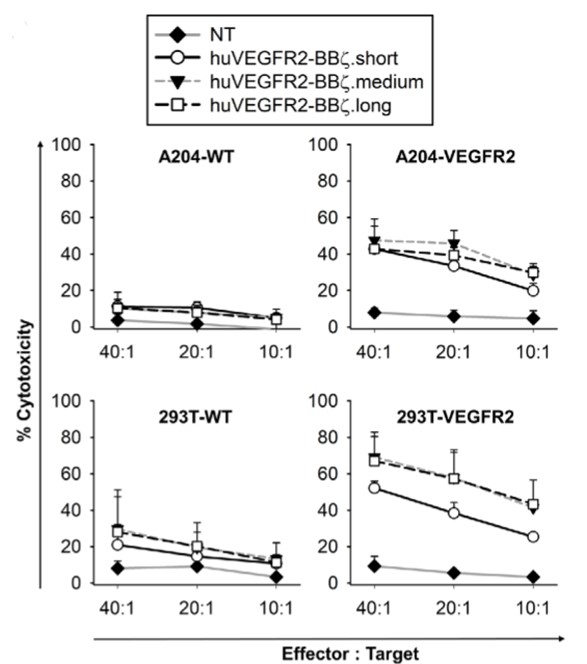 Fig.7 In vitrocytotoxicity test of anti-VEGFR-2 CAR-T cells co-cultured with target cells at indicated E:T ratio.2
Fig.7 In vitrocytotoxicity test of anti-VEGFR-2 CAR-T cells co-cultured with target cells at indicated E:T ratio.2
Spheroid killing assay to test the cytotoxicity of VEGFR-2 CAR-T
To more closely mimic cellular interactions in vitro, a target cell-based spheroid killing assay is often used in the cytotoxicity evaluation of CART cells. With the extension of time, the growth of tumor spheres and some apoptotic or proliferation markers were measured to indicate the killing of tumor spheroid by CART cells. Creative Biolabs is committed to developing these related assays to assess the cytotoxicity ability of CART cells.
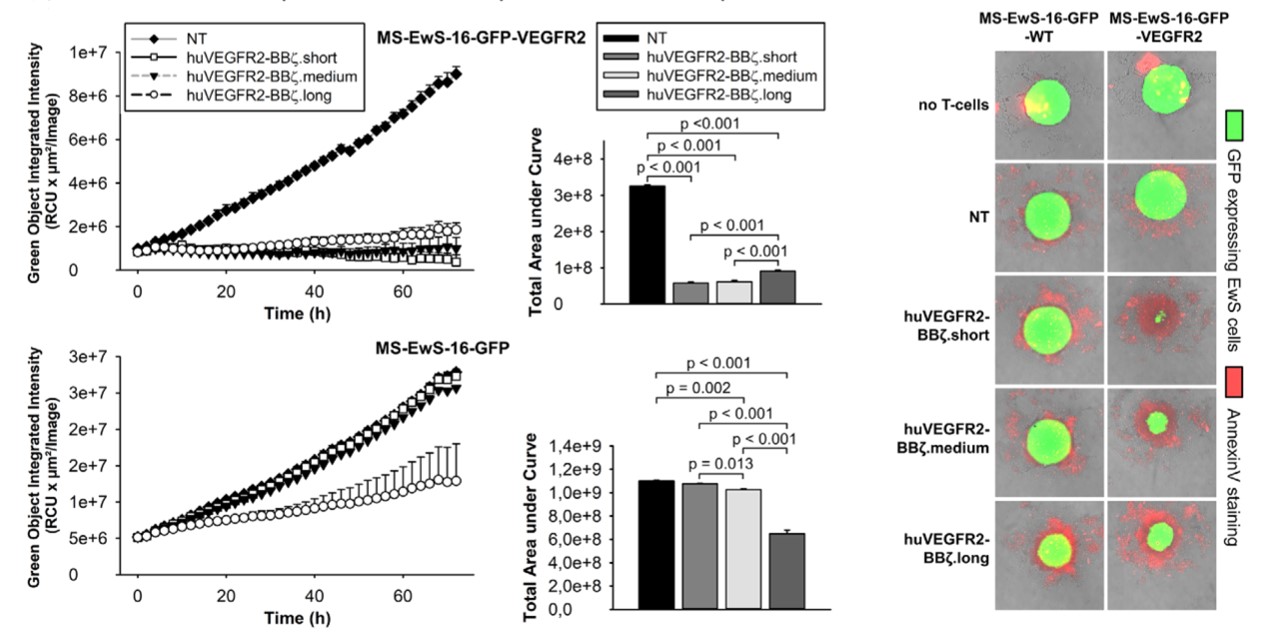 Fig.8 In vitro spheroid killing assay of VEGFR-2 CAR-T cells. Left panel: Time lapse (72 hours) growth measurement of target cell-based spheroid incubated with VEGFR-2 CAR-T cells. Center panel: Spheroid area measurement of analysis. Right panel: Apoptosis analysis of spheroids incubated with VEGFR-2 CAR-T cells by fluorescence microscope.2
Fig.8 In vitro spheroid killing assay of VEGFR-2 CAR-T cells. Left panel: Time lapse (72 hours) growth measurement of target cell-based spheroid incubated with VEGFR-2 CAR-T cells. Center panel: Spheroid area measurement of analysis. Right panel: Apoptosis analysis of spheroids incubated with VEGFR-2 CAR-T cells by fluorescence microscope.2
To evaluate the efficacy of CAR-T cells in vivo, Creative Biolabs has launched multiple in vivo animal models (e.g., xenograft, humanized, syngeneic, and transgenic models) and comprehensive in vivo experiments to accelerate CART development. In vivo experiments include but are not limited to the following items:
Anti-VEGFR-2 CAR-T Cell Therapy Animal Models
Efficacy Test of Anti-VEGFR-2 CAR-T
Toxicity Evaluation Anti-VEGFR-2 CAR-T
Persistence of anti-VEGFR-2 CAR-T cell
References
 Loading...
Loading...
| CAT | Product Name | Target Species | Antibody Clone | Antibody Host | Receptor Construction | Vector Type | Targeting Cell Type | CAR Vector Type | Inquiry & Datasheet |
| CAR-ZP029 | Anti-VEGFR-2 (AB1) h(CD28-CD3ζ) CAR, pCDCAR1 | Human | XHM578 | Mouse | scFv-CD28-CD3ζ | Lentiviral vector | T cell | ||
| CAR-ZP055 | Anti-VEGFR-2 (AB1) h(41BB-CD3ζ) CAR, pCDCAR1 | Human | XHM578 | Mouse | scFv-4-1BB-CD3ζ | Lentiviral vector | T cell | ||
| CAR-ZP062 | Anti-VEGFR-2 (KDR D1-7) h(41BB-CD3ζ) CAR, pCDCAR1 | Human | KDR D1-7 | Camelidae | scFv-4-1BB-CD3ζ | Lentiviral vector | T cell | ||
| CAR-ZP063 | Anti-VEGFR-2 (KDR D1-7) h(CD28-CD3ζ) CAR, pCDCAR1 | Human | KDR D1-7 | Camelidae | scFv-CD28-CD3ζ | Lentiviral vector | T cell | ||
| XS-1022-LX119 | Anti-mVEGFR-2 (X10X23) m(CD28-CD3ζ) CAR, pCDCAR1 | Mouse | X10X23 | Rat | scFv-CD28-CD3ζ | Lentiviral vector | T cell | ||
| XS-1022-LX143 | Anti-mVEGFR-2 (X10X23) m(41BB-CD3ζ) CAR, pCDCAR1 | Mouse | X10X23 | Rat | scFv-41BB-CD3ζ | Lentiviral vector | T cell | ||
| XS-1022-LX167 | Anti-mVEGFR-2 (X10X23) m(CD28-41BB-CD3ζ) CAR, pCDCAR1 | Mouse | X10X23 | Rat | scFv-CD28-41BB-CD3ζ | Lentiviral vector | T cell | ||
| XS-1022-LX191 | Anti-mVEGFR-2 (X10X23) Negative Control CAR, pCDCAR1 | Mouse | X10X23 | Rat | scFv-CD28/CD8TM | Lentiviral vector | T cell | ||
| XS-0323-LX258 | Anti-VEGFR-2 VHH(X3XH258) h(CD28-41BB-CD3ζ) CAR, pCDCAR1 Vector | Human | X3XH258 | VHH-CD28-41BB-CD3ζ | Lentiviral vector | T cell | CAR-T | ||
| XS-0323-LX259 | Anti-VEGFR-2 VHH(X3XH259) h(CD28-41BB-CD3ζ) CAR, pCDCAR1 Vector | Human | X3XH259 | VHH-CD28-41BB-CD3ζ | Lentiviral vector | T cell | CAR-T | ||
| XS-0323-LX260 | Anti-VEGFR-2 VHH(X3XH260) h(CD28-41BB-CD3ζ) CAR, pCDCAR1 Vector | Human | X3XH260 | VHH-CD28-41BB-CD3ζ | Lentiviral vector | T cell | CAR-T | ||
| XS-0323-LX261 | Anti-VEGFR-2 VHH(X3XH261) h(CD28-41BB-CD3ζ) CAR, pCDCAR1 Vector | Human | X3XH261 | VHH-CD28-41BB-CD3ζ | Lentiviral vector | T cell | CAR-T | ||
| XS-0323-LX627 | Anti-VEGFR-2 VHH(X3XH258) h(ICOS-41BB-CD3ζ) CAR, pCDCAR1 Vector | Human | X3XH258 | VHH-ICOS-4-1BB-CD3ζ | Lentiviral vector | T cell | CAR-T | ||
| XS-0323-LX628 | Anti-VEGFR-2 VHH(X3XH259) h(ICOS-41BB-CD3ζ) CAR, pCDCAR1 Vector | Human | X3XH259 | VHH-ICOS-4-1BB-CD3ζ | Lentiviral vector | T cell | CAR-T | ||
| XS-0323-LX629 | Anti-VEGFR-2 VHH(X3XH260) h(ICOS-41BB-CD3ζ) CAR, pCDCAR1 Vector | Human | X3XH260 | VHH-ICOS-4-1BB-CD3ζ | Lentiviral vector | T cell | CAR-T | ||
| XS-0323-LX630 | Anti-VEGFR-2 VHH(X3XH261) h(ICOS-41BB-CD3ζ) CAR, pCDCAR1 Vector | Human | X3XH261 | VHH-ICOS-4-1BB-CD3ζ | Lentiviral vector | T cell | CAR-T | ||
| XS-0323-LX996 | Anti-VEGFR-2 VHH(X3XH258) h(CD28-OX40-CD3ζ) CAR, pCDCAR1 Vector | Human | X3XH258 | VHH-CD28-OX40-CD3ζ | Lentiviral vector | T cell | CAR-T | ||
| XS-0323-LX997 | Anti-VEGFR-2 VHH(X3XH259) h(CD28-OX40-CD3ζ) CAR, pCDCAR1 Vector | Human | X3XH259 | VHH-CD28-OX40-CD3ζ | Lentiviral vector | T cell | CAR-T | ||
| XS-0323-LX998 | Anti-VEGFR-2 VHH(X3XH260) h(CD28-OX40-CD3ζ) CAR, pCDCAR1 Vector | Human | X3XH260 | VHH-CD28-OX40-CD3ζ | Lentiviral vector | T cell | CAR-T | ||
| XS-0323-LX999 | Anti-VEGFR-2 VHH(X3XH261) h(CD28-OX40-CD3ζ) CAR, pCDCAR1 Vector | Human | X3XH261 | VHH-CD28-OX40-CD3ζ | Lentiviral vector | T cell | CAR-T |
 NEWSLETTER
NEWSLETTER
The latest newsletter to introduce the latest breaking information, our site updates, field and other scientific news, important events, and insights from industry leaders
LEARN MORE NEWSLETTER NEW SOLUTION
NEW SOLUTION
CellRapeutics™ In Vivo Cell Engineering: One-stop in vivo T/B/NK cell and macrophage engineering services covering vectors construction to function verification.
LEARN MORE SOLUTION NOVEL TECHNOLOGY
NOVEL TECHNOLOGY
Silence™ CAR-T Cell: A novel platform to enhance CAR-T cell immunotherapy by combining RNAi technology to suppress genes that may impede CAR functionality.
LEARN MORE NOVEL TECHNOLOGY NEW SOLUTION
NEW SOLUTION
Canine CAR-T Therapy Development: From early target discovery, CAR design and construction, cell culture, and transfection, to in vitro and in vivo function validation.
LEARN MORE SOLUTION